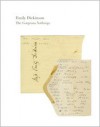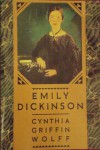Currently reading
Saints in Art
The Gorgeous Nothings: Emily Dickinson's Envelope Poems
Selected Poems
Emily Dickinson
Lies My Teacher Told Me : Everything Your American History Textbook Got Wrong
Gone with the Wind
Miracle on 34th Street: [Facsimile Edition]
![Miracle on 34th Street: [Facsimile Edition] - Valentine Davies](http://booklikes.com/photo/max/200/300/upload/books/5/e/azure_5e8249d6fdc7c2b61f8272a79efa5fa0.jpg) I can't do anything really crafty, but I can fill in the cross-stitches if you give me a counted-cross-stitch kit. (I like the looks of those better than the printed ones.) I've been working on and off for years on a tree skirt kit. It has dark blue fabric, and the picture is of some beautiful animals and a seriously awesome St. Nicholas, wearing pale blue and looking rather fierce.
I can't do anything really crafty, but I can fill in the cross-stitches if you give me a counted-cross-stitch kit. (I like the looks of those better than the printed ones.) I've been working on and off for years on a tree skirt kit. It has dark blue fabric, and the picture is of some beautiful animals and a seriously awesome St. Nicholas, wearing pale blue and looking rather fierce.I chose this pattern because I've never really liked the traditional Santa Claus – all omni-benevolent and generically sweet. I like the idea of a volatile elemental spirit, a guardian of children who doesn't have any illusions about them.
So I enjoyed Miracle, because this Kris Kringle isn't sweet. Or rather, he isn't just sweet. He's capricious and irritable as well as open-handed, mischievous, and (of course) generous. He can have fits of stubbornness, anger, and despair. He's human, only more so.
This novel was written by a screenwriter named Valentine Davies who came up with the idea and pitched it first to his harshest critic: his wife. Rather to his surprise, she thought it sounded terrific. So he pitched it to Twentieth Century-Fox. They liked it, too.
Interestingly, Davies wrote the novel but not the screenplay – which probably accounts for some differences between the two. The book and the movie were released at the same time, and Davies won an Academy Award for best original story.
I haven't seen the movie in quite a while, because I strongly disagree with the premise. I'm a fiction writer, and I've lived in a constantly shifting world of my own creation for as long as I can remember. (It would probably be more accurate to say "worlds," since this place in my head is as multileveled as Norse mythology, but has more laser weapons.)
This imaginary place is far more precious and interesting to me than the rock-solid real one everyone can see. I don't need to claim that my fantasies are "true" to grant them the significance in my life that they deserve. Some of my most important relationships are with people who don't technically exist.
So I don't understand or agree with the idea that the way to give children imagination is to tell them a story and then insist the characters in that story really exist. How does that teach them creativity? They don't have to use their imaginations. You've already told them everything.
I'm not arguing against playing Santa with kids, although as a parent I treated Santa Claus as just one more fairy-tale character and never gave him credit for the Christmas-morning wonders I worked my butt off to make happen. But I have no quarrel with people who tell their kids Santa is real. After all, most Americans grow up with that story, and they grow up just – well, okay, most Americans grow up to be total fruitcakes. But I don't blame Santa for that.
I'm just saying, I don't see any connection between developing the imagination and being told Santa Claus exists.
But if there were a Santa Claus, I'd like to imagine him as someone just like Valentine Davies' character: kind, impatient, humorous, animal-loving, imperious, and compassionate.








